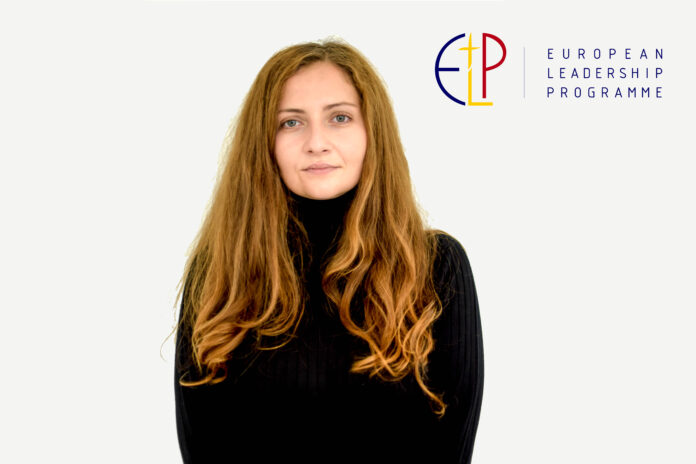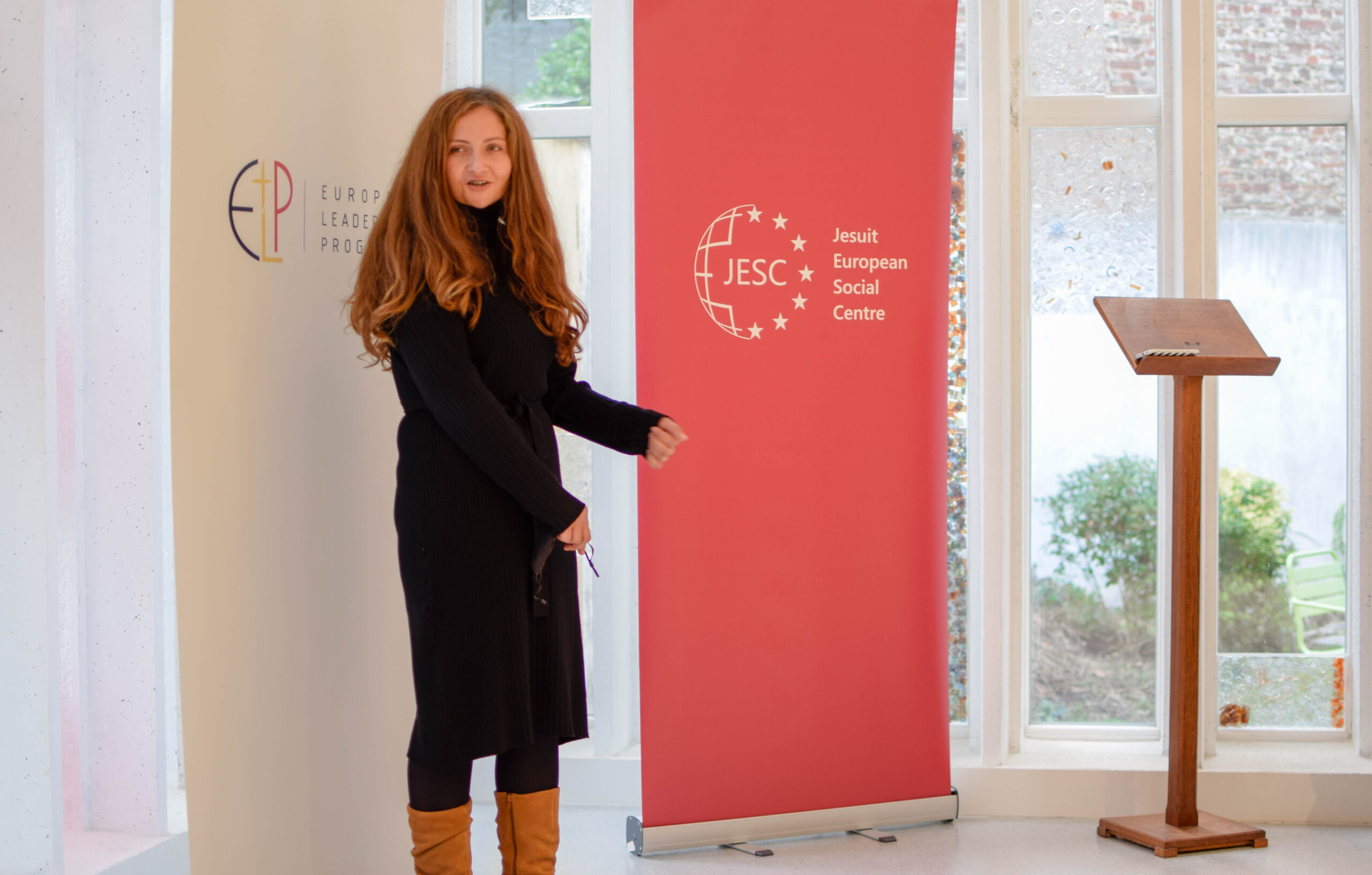The European Leadership Programme is about personal and professional growth. It opens a career pathway for those who want to become European leaders. It also gives them the possibility to decide how to manage their life in Brussels and define their learning process. The ELP involves commitment, effort, interest, curiosity, meeting deadlines, participation in sessions and discussions and community life. With the purpose of inaugurating its 4th edition, The European Leadership Programme (ELP) will interview the Fellows to share their impressions, expectations, ambitions and general thoughts linked to the Programme and their new life in Brussels, the EU Capital.
Name: Adina Nutu
Country: Romania
Traineeship placement: Management Centre Europe (MCE)
Who are you? We want to get to know you.
Q: Tell us a bit about yourself.
I was born and raised in Romania. The region where I grew up it is called Bucovina. It is a very beautiful place where you are surrounded by nature at every corner. I believe that growing up there enhanced my passion for traveling and exploration. Moving on to my education, I am a History graduate. Both my undergraduate and postgraduate studies have been conducted at the University of Dundee in Scotland. My studies shaped my interest and skills in research, comparative history, social concepts and political science. My previous experiences were linked to social and cultural research, communication, humanitarian work, and cultural project management.
Q: Describe yourself in three words.
Dedicated, ambitious, optimistic.
Q: What are your interests or hobbies outside of work?
Outside work I like to keep an active lifestyle. Of course, I very much like to travel, although, this has been put on hold for this year. My outdoors activities usually involve trekking and horseback riding. I also like to play board games, read, and watch films and documentaries. Friends are very important to me, and whenever it’s possible, I try to spend as much time as possible with them.
Q: Do you have any inspirational person or quote?
One quote that I really like, and I think is really important to bear in mind, especially in today’s environment is: ‘I have not failed. I’ve just found 10,000 ways that won’t work.’ by Thomas Edison. I think that we are too eager to label every little setback as a failure and this can put a lot of strain on our emotional health. The way I like to look at it is that at end of the day an experience is an experience, good or bad, it can definitely teach us something.
Q:What motivates you in life/ What are you passionate about?
Knowing that either through my work or personal involvement, I can make a difference in the life of others keeps me motivated. I am also very focused on personal growth and development. I genuinely believe that our educational process does not stop once we graduate from our studies, hence I will always seek to build on that through everything I am doing. Skills
Career Goals
Q: How would you describe your ideal job and how can ELP help you achieve that?
I know that I would like to build a career in an environment with a positive social impact. Through the philosophy behind the programme and tools offered to their fellows ELP, to some extent, enables you to choose and pave the direction in which you wish to proceed.
Q:What are your short and long-term career plans?
In the past few years I tried to strengthen my international profile and participate in various activities linked with culture, social inclusion, and research. I truly believe that in order to have a good understanding of how societies function you need the hands-on experience. I have always been interested in European institutions and affairs and by being in Brussels I seek to enhance my knowledge in this regard. Long term I plan to focus more on research and project management. skills
ELP Programme (aspirations and expectations)
Q: What was your motivation to apply to the ELP?
The ELP is a multi-layered programme and this is what attracted me the most. The combination of social-political experiences, guided learning, social service, community engagement, and spiritual formation create an extremely valuable experience for the fellows.
Q: Did your experience so far meet your general expectations of the Programme?
Often expectations can make you lose sight of what you are actually experiencing, because you are focusing on something that can either turn into a self-fulfilling prophecy or bitter disappointment. Expectations often imply passivity. Instead, whenever I have a new experience, I like to draw a list of goals. Goals are something that I have control over, and I can work towards achieving them. In this sense, ELP is enabling me to achieve them through the learning experiences offered by the programme.
Q: What is the biggest challenge that you face so far (overall)?
I cannot say that I am going through a challenge at the moment, although, the past months have been slightly challenging and more confusing, they also reminded me of the importance of staying focused. Of course, I experienced, and I will experience setbacks, but these are all part of the learning / growing process and can be solved. Skills
Q: What do you expect to achieve with this Programme?
At the end of the programme I am looking forward to having a more nuanced understanding of leadership, a clearer direction in terms of professional development, and a stronger knowledge of European affairs.
Traineeships in times of COVID-19
Q: How has Covid-19 affected your life and professional experience in Brussels?
Usually when you move to a new country you expect to explore of it as much as possible. Covid-19 tremendously impacted these experiences. In some way I can say that I am having a secluded international experience because although I live in an international community and I work in an international environment, I am missing the local experiences.
Q: How did COVID-19 affect your traineeship?
I started my traineeship when working from home was already the norm, so I was anticipating it would be different from a traineeship done in 2019 for example. I did have a few days in the office where I had the opportunity to meet some of my colleagues. This was very important as it validated my experience. Putting faces to names and meeting with people I’d only met virtually made the whole process much easier. Now, I am entirely working from home, which can make one’s life slightly more tedious at times.
Lifestyle in Brussels
Q: Tell us a bit about the experience of sharing a house in Brussels.
Sharing a house is not something new to me. I have done it for many years and in many locations in the past. With every experience being different, the one in Brussels fits the norm in a very positive way. My flatmates and I are all coming from different countries and cultures, we have many experiences behind us, and I believe this is something that creates a rich shared experience for all of us.
Q: Can you describe what a typical day in your life in Brussels looks like?
When working from the office was permitted my days required more planning ahead to make sure that I commute to and from the office in time for a talk or a meeting. However, now that most of the activities have moved online, I can see how less planning is required as I can attend everything from one location. By no means does this signify that less work is required, or that the nine to five pattern applies. ELP is making sure that we are keeping busy and engaged, and often my workday will start at 7 am and finish somewhere around 8 – 9 pm. Skills
Q: How are you adapting to Brussels and to this new experience outside your country?
Before Brussels I lived in the United Kingdom and in Cyprus; adapting to a new environment is something that I have always done with ease. My adaptability is a trait that I am particularly glad to possess. Brussels is slightly different because immediately after my arrival I was immersed in a programme and in a traineeship, while the city was slowly-slowly adopting stricter measures in terms of social isolation. Overall, it is a positive process and I am looking forward to what the next months will bring.
Leadership
Q: How do you think ELP will help you in the path of becoming a better leader?
The ELP, through the activities organised, guest speakers, community engagement, and the abundance of resources offers their fellows the tools to shape the path they want to follow at the end of the programme. For me, the possibility of learning from experienced leaders and seeing how their professional experiences shaped their futures is extremely valuable. The fact that each fellow is offered professional mentorship along with spiritual mentorship are two essential key aspects of professional development.
Q: What leadership skills did you learn so far/or except to learn?
At the moment I am answering this interview I have been part of the ELP for less than four weeks, so it is an ongoing process. What I can say for sure though, is that the past few weeks allowed me to reflect on what leadership is and how the skills of a leader could be nurtured to fit modern environments. Skills Skills
Q: ELP encourages Fellows to engage in community service through volunteering. What do you think about Volunteering and what are your plans to volunteer?
In terms of volunteering I have quite a broad experience; I see it as the perfect opportunity to engage with the local communities while making a contribution. In Brussels many volunteering organisations have been impacted by the Covid-19 situation; for some this means that volunteers are in high demand, while others had to place all the voluntary opportunities on hold. On a personal level, I am planning to use my communication skills for a youth organisation as a volunteer. ELP also introduced its fellows to Serve the City, a global movement. Through Serve the City the volunteers are able to aid the most vulnerable in the society in various practical ways, such us organising donations, serving meals, etc. It is a great initiative and I look forward to contributing to their activities.
Q: What part of the Programme you are looking forward to the most; meeting any speaker, a specific lecture or activity?
All parts of the programme are very interesting and equally engaging, therefore pinpointing just one doesn’t seem fair. If I have to narrow it down to one then it will be the research / writing of an essay part, mainly because the past few weeks have nurtured my creativity and research is one of the main activities, I have missed the most in the past few months.






